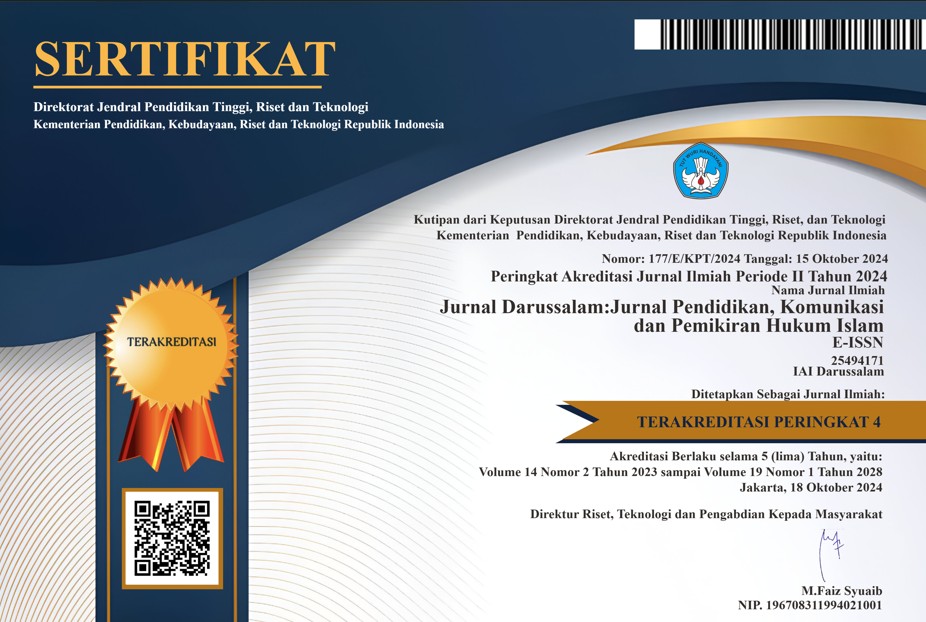Ethics of Publication
Publication Ethics and Malpractice Statement
Darussalam: Journal of Islamic Sciences is a best-selling national journal published twice a year in print and online by IAI Darussalam Press. This statement explains the ethical behavior of all parties involved in publishing articles in Darussalam: Journal of Islamic Studies, including authors, editorial boards, bestari's partners, and publishers. This statement is based on COPE's Best Practice Guidelines for Journal Editors.
Publishing Ethics Guidelines
Publishing articles in Darussalam: The Journal of Islamic Sciences is an important building block in the development of a coherent and respected network of knowledge. This is a direct reflection of the work quality of the authors and the institutions that support them. The articles reviewed support and contain scientific methods. It is therefore important to agree to the standards of ethical behavior expected for all parties involved in publishing: authors, journal editors, best-of-breed partners, publishers, and the public.
IAI Darussalam Press as Darussalam publisher: Journal of Islamic Sciences is responsible for guarding all stages of publishing seriously and acknowledging ethical responsibilities and other responsibilities. Institutions other than committed to ensuring that reprint advertisements and other commercial revenue have no impact or effect on editorial decisions, are also committed to assisting communication with other journal and / or publisher managers if deemed useful and necessary.
Publishing Decision
Darussalam Editor: The Journal of Islamic Sciences is responsible for deciding which of the submitted articles should be published. The validation of the work and its importance to researchers and readers should always encourage that decision. The editor can be guided by a policy board of editors of the journal and is limited by the provisions of the law as it should be enforced regarding libel, copyright infringement and plagiarism ( plagiarism ). Editors may negotiate with other editors or assessment teams in making this decision.
Fair Treatment
Editors always rate the text based on their intellectual content without distinction of race, gender, sexual orientation, religious beliefs, ethnic origin, citizenship or political philosophy of authors.
Confidentiality
Editors and editing staff may not disclose any information about manuscripts submitted to anyone other than authors, expert editors, bestsellers, and publishers.
Notice and Conflict of Interest
Unpublished materials disclosed in submitted manuscripts may not be used in the editor's own research without the express written consent of the author.
Contributions to Editorial Decisions
Assessment of bestari partners helps editors in making editorial decisions and through editorial communication with authors can also help authors improve their writing.
Speed
Any eligible appraiser who feels unqualified to assess the research reported in a manuscript or knows that his quick review will be unlikely to have to notify the editor and free himself from the assessment process.
Confidentiality
Any text received for judgment must be treated as a confidential document. The document should not be shown or discussed with anyone else unless authorized by the editor.
Standards of Objectivity
Assessment must be done objectively. Criticism is personal to the author is not justified. Valuers must express their views clearly with supporting arguments.
Source Recognition
Valuers must identify relevant published works that are not quoted by the author. Any statement that an observation, derivation, or argument has been previously reported must be accompanied by a relevant quote. An assessor should also ask the editor to pay attention to the similarity or overlap between the assessed text and other published articles.
Notice and Conflict of Interest
Confidential information or opinions obtained through the appraisal of a bestary partner shall be kept confidential and shall not be used for personal gain. Assessors should not weigh scripts in which they have a conflict of interest arising from a connection or connection of a competitive, cooperative, or other nature with any author, company, or agency associated with the article.
Reporting Standards
The author must present an accurate report of the work being made and an objective discussion of its significance. The principal data must be accurately represented in writing. A post should include enough detail and references to enable others to repeat the work. Fraudulent or intentionally inaccurate statements are unethical and unacceptable behavior.
Originality and Plagiarism
The authors must ensure that they have written works that are entirely original, and that they have quoted correctly if using the work and / or the words of others.
Double Publishing, Repetition or Simultaneously
A writer in general should not publish a script that essentially explains the same research in more than one major journal or publication. Submitting the same script to more than one journal simultaneously is unethical and unacceptable behavior.
Source Recognition
Fair recognition of the work of others must always be given. The authors should cite the influential publications in determining the nature of the work reported.
Authorship Authorship
Authorship should be limited to those who make an important contribution to the reported conception, design, execution or interpretation of the study. All important contributors should be listed as co-authors . If there are other people who participated in certain important aspects of the research project, they should be acknowledged or listed as contributors ( contiributors ). The right writer should ensure that all appropriate joint authors are included in the paper, and that all joint authors have seen and approved the final version of the text and have agreed to submit it for publication.
Notice and Conflict of Interest
All authors must notify in their text any financial conflicts or other substantive conflicts that may be allegedly influencing the outcome or interpretation of their manuscript. All financial support for the project should be notified.
A fundamental mistake in published works
If an author finds significant errors or inaccuracies in his or her publications, it is incumbent upon the author to immediately notify the editor or publisher of the journal and work with the editor to retract or correct the writing.















